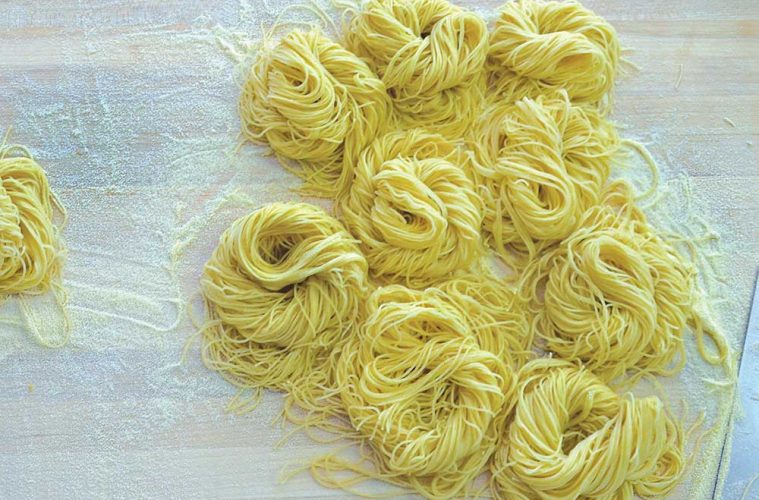Narrow planters filled with basil line the windows inside Pastaio Via Corte, a new pasta shop in Gloucester, waiting for any customer to pluck a handful for free. It’s a small thing, but it speaks volumes about owner Danielle Glantz, who is less interested in maximizing profits than in using her delicious handmade pasta to encourage people to think more about where their food is coming from—and show them that cooking locally doesn’t have to be costly or burdensome.
“Everybody loves pasta, and I think it’s one of the easiest ways to start the conversation on sustainably grown wheat,” Glantz says, explaining that wheat is one of the biggest crops grown in the U.S., but very little of it is farmed or processed using organic methods.
Seeking to support local farms while sourcing the best flour for her rustic pastas, Glantz researched her options extensively before settling on three main suppliers, who are all organic, non-GMO, and as local as possible. Her whole-wheat flour comes from Alprilla Farm in Essex, and the powdery “double-zero”—so called for its fine texture—is from Maine Grains in Skowhegan, Maine. Because durum semolina wheat doesn’t grow well in New England, Glantz imports it from La Milanaise, just north of the border in Quebec, Canada.
While Glantz pays a premium for the local grains—many times the cost of double-zero flour imported from Italy—she says the combination of growing and processing practices at the smaller-scale farms yields a much healthier final product while supporting the local economy.
“We need to get back to old-world traditions and living off of communities,” Glantz says. “[Gloucester] is a place where a community can thrive on [its] own, given the right outlets to buy things. We have the best fish, we have the best produce.… I’m surrounded by passionate people, whether they are fishermen or farmers or everyday types of people. They all want good-quality food.”
It’s clear that Glantz is focused as much on community as she is on pasta—and that is saying something. Her knowledge of noodle shapes and how to sauce them is nearly encyclopedic, and any customer who stops in is likely to catch her in the middle of rolling out some special shape on the hand-hewn custom maple counter, cut from trees in western Massachusetts, where she grew up.
“I like to do pastas that nobody hand-makes anymore,” Glantz says. Her minimalist setup includes a stand mixer, a pasta machine for flattening the dough, a short magnetic strip attached to the wall holding a few knives, some specialty rods for rolling hollow pasta, and a few hand-carved wooden boards that imprint patterns on the pliable dough. That’s it. And in this peaceful shop, she’s turning out between 40 and 70 pounds of pasta a day, depending on the complexity, from whole wheat radiatore to ravioli, which are made only on Thursdays and Saturdays and stuffed with local cheese and produce.
While her pasta is a good start, Glantz realizes it’s surprisingly difficult for the average consumer to track down local food—and she’s willing to help in any way she can. “Even here in Gloucester, it’s hard to buy local whiting, butterfish, or real Gloucester haddock,” she says. To that end, she tries to help her customers make connections with other local vendors, and is hoping to open her space to occasional pop-up fish markets. Glantz already offers complimentary space in her store to local growers at times—and then makes pastas and offers recipes that will showcase whatever the farmer brings in.
Interacting with the public is a change for Glantz, who has spent her impressive career up until now in restaurant kitchens. She spent four years working with Alice Waters, a pioneer in the sustainable food movement, at the storied Chez Panisse in Berkeley, California, before returning to Massachusetts, to work as a chef at Gloucester’s Short + Main. “Coming out of the kitchen and not being a chef any more, I’ve learned that people still are cooking at home,” Glantz says.
The offerings at Pastaio Via Corte, which translates to “pasta maker on a short street,” make it easy to prepare a fast, healthy meal. Customers can buy just as much pasta as they need, and with the few simple ingredients Glantz carries—a carefully selected array of cheeses, olives, capers, anchovies, butter, and a house-made tomato sauce—even the cooking-challenged can come up with a plethora of fast, fresh dinners. When a customer comes in for some black squid ink pasta, Glantz offers to portion out the ingredients for a flavorful puttanesca sauce to pair it with, sending the customer home with the makings of a fresh, cost-effective dinner that can be whipped up while the water is coming to a boil. In service to the time-pressed, the shop is open seven days a week until 7 p.m., just to make sure people can grab the fixings on the way home from work.
“I just want to provide the community with good food options,” Glantz says modestly. “I want to be the local pasta maker.”
Pastaio Via Corte
11 Center St. Gloucester
978-868-5005

